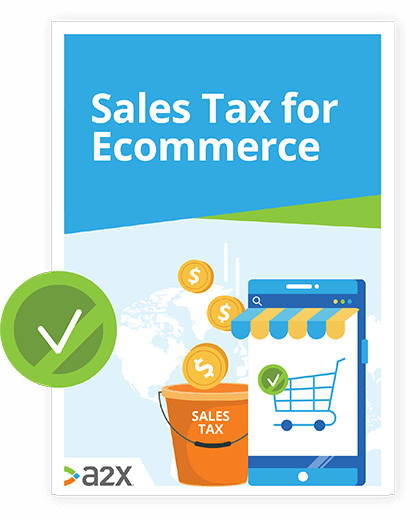
What is Sales Tax?

This article is a guest post from our good friends at MuseMinded. They have teamed up with The Tax Butler to offer a free sales tax starter kit for US-based Amazon sellers.
This is the first blog in a three-part series which looks at the basics of sales tax for ecommerce sellers and where you can find help. The next two parts cover:
- Sales tax strategies for Amazon FBA sellers in the United States.
- Options for filing your sales tax returns.
In the Amazon FBA community, sales tax has become quite a controversial topic during recent years. To understand why, let’s start by taking a look at what sales tax actually is.
Sales tax is a ‘consumption tax’, which is supposed to be paid when a good is consumed (or sold at the retail level).
Retail businesses are collection agents that have a responsibility to act on behalf of the state and pass on any tax revenue.
“Another way to look at it is that it’s a (usually small) fee you pay to the government for providing the infrastructure needed to deliver the products you consume”
Rather than being administered by the federal government, sales taxes regulations are created and enforced by each individual state. Every state has different rules about their tax rates, filing frequencies and other requirements, which is where the complexity arises.
Before ecommerce existed, the process of collecting and remitting sales tax was a relatively straightforward affair - for local businesses, it usually involved simply registering in their home state. Larger businesses were required to comply in multiple states.
However, as an Amazon FBA seller, you inventory is spread throughout the country and you have limited ability to control which states your sales come from. This creates a large degree of sales tax exposure due to a concept called nexus.
Where Do I Register for Sales Tax?
As far as the law is concerned, you have a responsibility to register as a collection agent wherever you have nexus.
You may be wondering at this point what on earth nexus actually is.
“The word nexus is a Latin, meaning to bind, join or tie. Since ancient Roman times, it has evolved to mean ‘a connected series or group."
- TaxJar
In the context of sales tax, it means that if you have nexus in a state, then you have a significant enough physical connection to the state to be considered its sales tax agent.
The three most common ways that nexus is created include:
- Home State - this is where you live and operate your business from. Sellers normally begin by registering in their home state, and branching out from there. It’s also important to note that if you live in one state and incorporate your business in another state, then you will need to register for sales tax in both states.
- Employees - if you have any employees or business partners that live in different states, this will also create nexus - it’s where your team lives.
- Inventory - by keeping your inventory in a state, it creates a significant physical presence. In the state’s eyes, this is where your inventory lives.
As an FBA seller, your inventory location ends up making a HUGE impact on how you need to comply with sales tax.
Amazon has fulfilment warehouses in 25+ states, and once you send your stock to one warehouse, Amazon will normally move your goods around their network of facilities. Once your inventory is stored in FBA, you have no control over where it goes.
Amazon moves stock around in this manner to bring it closer to customers - reducing shipping times and improving customer service. This is great for shoppers, but it results in major sales tax issues for sellers.
“In my experience, most sellers’ inventory will be spread across 90%+ states within just the first 6-12 months of using FBA.”
But Wait, Doesn’t Amazon Take Care of This for Me?
Unfortunately not. Whilst it is common for sellers to think that the burden of complying with sales tax laws completely falls on Amazon, the truth is that if you signed up as a third-party seller, then you will have signed off in your agreement that you accept the full burden of complying with sales tax laws - whether you actually read the contract or not.
As the state’s agent, it is your responsibility to:
- Identify yourself to the state by registering for a sales tax license.
- Collect sales tax from qualifying customers.
- Intermittently send a report of your sales tax activity in the state.
- Hand over the amount of sales tax you should have collected - regardless of whether you actually collected the right amount or not.
If you don’t have a sales tax license, then you cannot collect sales tax. However, you are still responsible for paying it over to the state (out of your own pocket). The consequences of not complying range from penalties and interest to legal action.
That Sounds Costly, What Do I Do About it?
There are a few different strategies that sellers often take to become compliant whilst reducing the risk of getting in trouble for not paying sales tax, which we will be discussing in the next blog post.
For a more detailed overview of where you need to pay sales tax, along with much more valuable information, sign up for our free crash course in Amazon sales tax.
Part Two: Sales Tax Strategies for Amazon FBA Sellers
Also on the blog:
Learn how to manage your sales tax obligations like a pro
Sales tax is complex and the costs for getting it wrong can be significant. Discover the key terminology, compliance strategies as you grow, and how to set your business up for success.
Download our free guide


